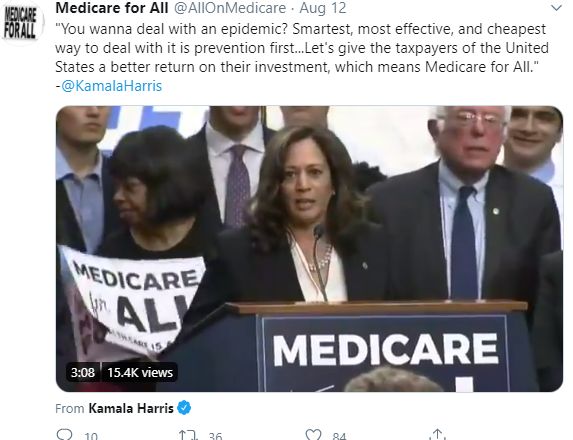Good to see some pushback from Ro Khanna on the DNC Platform, which tosses in a few potentially decent scraps of proposals, but which also goes backwards on lowering the Medicare eligibility age, and–egregiously, and of course–fails to endores Medicare for All, in spite of overwhelming support for MFA among Dems and ALL voters, which you would think would be an important consideration. But you’d be thinking wrong.
Continuing its grotesque retreat from supporting any proposals of value to, oh say 80 percent of Americans, the slogan of the party this time around, in a climate of precarity and suffering that would have been shocking to even contemplate six months ago, is
- Get In Line
- Shut Up and Vote for Us
- You’ll Get Nothing and Like It
- Trump is a big baby yellow Cheeto!
That high-handed contempt for the voices of all but the donors and lobbyists and apparatchniks running (ruining) the party, worked so well for the Clinton campaign that the Dems are going with it again.
All but a couple of the Dem presidential candidates supported Medicare for All going into the primary. Hell, the Vice Presidential nominee co-sponsored Bernie Sanders’ MFA bill in the Senate!

Doesn’t take a tinfoil hat to conclude that the main purpose of that grotesque, farcical spectacle was to quash support for MFA–which is supported by nearly 90 percent of Democrats!
Ro Khanna’s statement of why he will not support the DNC Platform is worth reading:.”
Yet history teaches us that the Democratic Party has sometimes faced an issue so great that it alone should be the yardstick for measuring the wisdom of voting for or against the platform. This is one of those times.
In 1948, there was going to be a split in the Democratic Party regardless of the national convention’s vote on civil rights. Those who stood up and demanded a plank for civil rights in the platform fundamentally changed our party’s direction.
Likewise, in 1968, I also believe that I would have stood up and not supported a platform that failed to clearly call for ending the U.S. warfare in Vietnam.
In my view, 2020 presents us with another such issue.
I believe that moving away from a profit-based healthcare system is the moral issue of our time. And in the final analysis, because of that belief, I could not vote for a platform that lacks a clear statement supporting Medicare for All.
I have heard the arguments made as to why I, or any other delegate, should just get in line and vote for the platform. Two of those arguments resonated, and I would like to address them.
“With Trump in the White House,” some might say, “we need 100 percent unity, and anything that would chip away at unity is dangerous to undertake—including a no vote on the platform.”
No doubt, the specter of four more years of Donald Trump is a compelling argument for unity—but the thing is, I see a vote of conscience against the platform as an ultimate show of unity. A party that cannot embrace honest debate and differences of opinion would be too rigid to learn or to grow wiser.
Some may ask: “Why does the left have such a hard time understanding that you don’t get 100 percent of what you want, that the truly great gains are made incrementally?”
To this I say, nobody understands the realities of incrementalism better than progressives. Harry Truman ran and won on universal healthcare in 1948, and it was part of Democratic Party platforms until 1980. Thirty-six years later, the 2016 platform merely called for lowering the eligibility age for Medicare to 55. The 2020 platform proposes raising the goal to 60. That is not incrementalism; that is moving backwards.
This tweet sums it all up rather nicely.

Related: Déjà vu all over again, from four years ago…